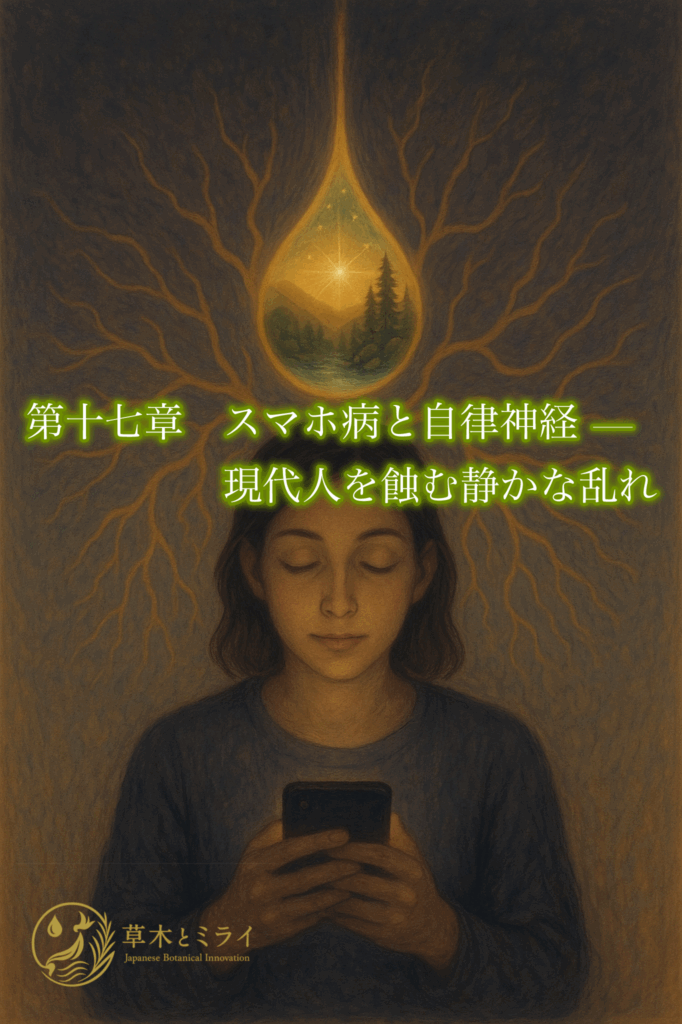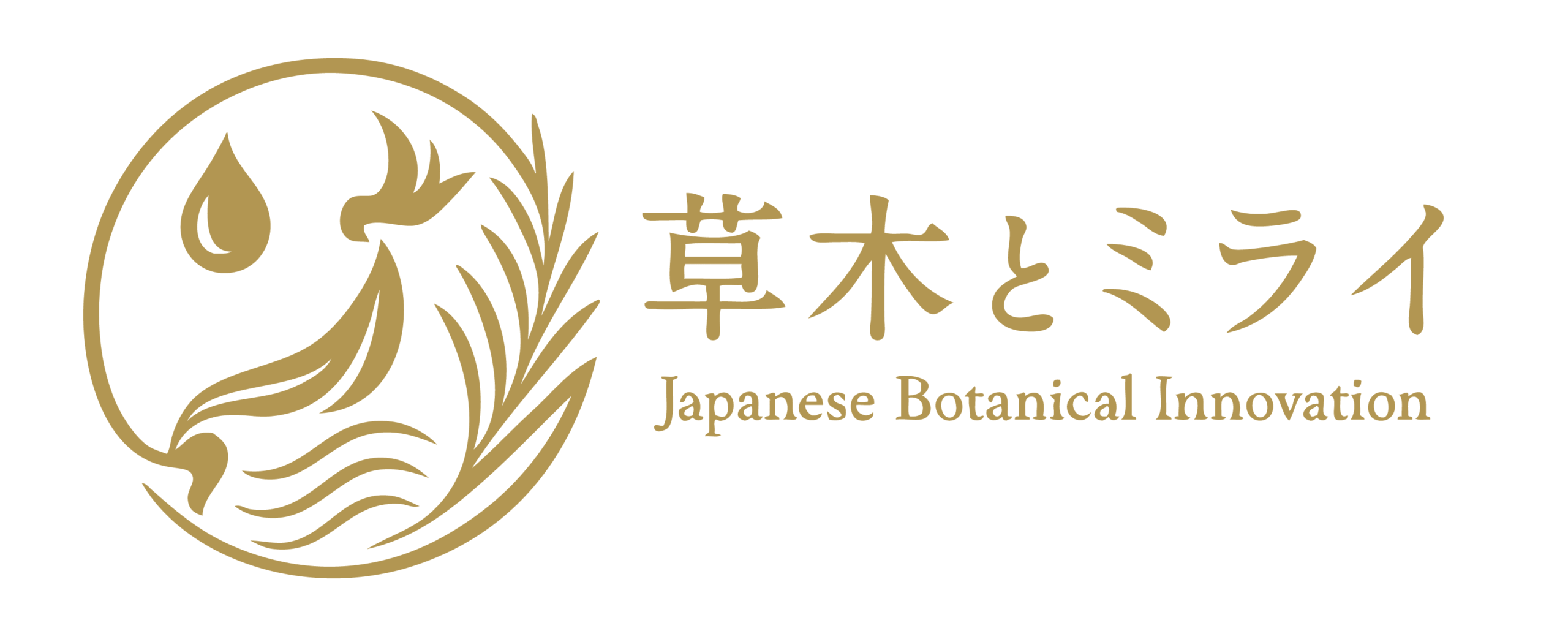Chapter 17 — Smartphone Syndrome and the Autonomic Nervous System: The Quiet Disturbance Consuming Modern Humanity

私たちの暮らしは、いまやスマートフォンなしには成り立たない。朝の目覚ましも、仕事の連絡も、買い物も、情報収集も――
一日を通して、私たちは無意識のうちに小さな画面を覗き込み続けている。その便利さの裏で、静かに進行しているのが――目には見えない “スマホ病” という名の現代の病である。長時間の画面使用や情報過多による緊張状態は、心身のバランスを司る 自律神経 に大きな負担をかけている。
自律神経は、呼吸・血流・体温・内臓の働きといった、生命維持のすべてを支配する “見えない指揮系統”。そのリズムが乱れれば、集中力の低下、不眠、慢性的な疲労、そして心の不調へと連鎖していく。
自律神経の乱れがもたらすもの
人間は、緊張と安らぎ――
その二つの波を行き来して生きている。
自律神経には、
「活動モード」の 交感神経 と、
「休息モード」の 副交感神経 があり、
この二つが絶妙なリズムで切り替わることで、
私たちは一日の中で緊張と回復を繰り返している。
しかし現代人の多くは、
・仕事やスマホによる過剰な刺激
・睡眠不足や浅い呼吸
・運動不足や姿勢の歪み
などによって、常に交感神経が優位になりがちだ。
その結果――
・頭痛や肩こり、目の疲れ
・睡眠の質の低下、寝つきの悪さ
・イライラ、集中力の低下
・ホルモンバランスや免疫力の乱れ
・肌荒れや脱毛、代謝の低下
こうした「慢性的な疲れ」や「理由のわからない不調」が、知らぬ間に積み重なっていく。いわば、現代社会における “静かな内なる炎症” である。そしてそれは、外見の美しさだけでなく、心の安定と生きる力までも蝕んでいく……。
身体の畑が壊れている
私は、長年“原理原則”を探究する者として、「腸内環境の重要性」を訴えてきた。森下・千島学説では、「腸が血を造る」と説かれている。腸内環境が良ければ、清らかな血液が生まれ、腸内環境が悪化すれば、その血は濁り、全身に影響を及ぼす。万病の多くは、血液の汚れに起因する――これは、かつての常識であった。
植物性の食事や発酵食品は腸を整え、動物性食品や加工品はその逆をもたらす。いわば、腸は「健康という作物を育てる畑」であり、そこを耕すことが健康の一丁目一番地だった。ところが近年、その常識を根底から覆す“異変”が起きはじめている。それが、ストレスや自律神経の乱れから発症する潰瘍性大腸炎 という現象である。これは、国の難病指定にもなっている。
私の私見では、自律神経が壊れ、「陽(交感神経)」が過剰に暴走 した結果、腸の壁が焼けただれるように傷ついていく――それが「潰瘍性大腸炎」ではないかと考えている。
そしてその逆、自律神経が壊れ、「陰(副交感神経)」が停滞し過ぎたとき、細胞の新陳代謝が鈍化し、異常増殖が起こる。それが「大腸ガン」として現れるのではないかと推測している。
つまり――腸という“身体の畑”が、自律神経という“天候”の乱れによって壊れているのである。かつて食や運動だけでは説明できなかった病の背景に、見えない神経の乱れが深く関与している。自律神経が乱れれば、腸が乱れ、血が乱れる。血が乱れれば、心が乱れ、生命のリズムそのものが狂っていく。この連鎖こそ、現代人を静かに蝕む“根の病”なのかもしれない。
生命のリズムを壊す見えない波
恐ろしいのは、自律神経の乱れが単なる一個人の不調にとどまらないことだ。文化や食、風習――それら“人間らしさ”の根をも静かに揺るがしている。
なぜなら――
身体に良いとされてきた食べ物も、自律神経が乱れることでその指揮系統が誤作動を起こし、本来 “良いはずのもの” を “悪いもの” と錯覚してしまう可能性があるからだ。つまり、自律神経の乱れは、私たちの 身体の常識そのものを裏切る現象 なのだ。近年増加する原因不明の不調、難病や奇病の一部も、その根底にはこの見えない乱れが関わっている可能性がある。
これは、我々の常識を根底から覆す、
かつての人類が経験していない――
人類史上最大の危機かもしれない……。
偶然と必然のあいだに生まれたもの
自律神経の中枢は、首の後ろ・耳の裏・後頭部など、まさに 頭皮と地続きの領域 に存在する。つまり、頭皮を整えることは単なる美容ではなく、脳と神経のリズムを調える行為そのものである。それは、頭皮という“身体の最前線”から、心身全体の調律を試みる行為でもあった。
パソコンやスマホ操作で前傾姿勢が続くと、頭部に熱がこもり、血行が滞り、首や肩が緊張し、交感神経が優位に傾く。この状態を解きほぐすためには、頭皮から“感覚神経”に直接アプローチする必要がある。だからこそ、「ヘアトニック」という形は必然だった。
香り、清涼感、浸透、マッサージ――その一つひとつが五感を刺激し、体内に眠る「自然のリズム」を呼び覚ます。頭皮は、単なる“髪の土台”ではなく、心と身体を結ぶスイッチ なのだ。そして、この“形”が選ばれたことにも、深い意味がある。偶然と必然が幾重にも積み重なり、奇跡的なタイミングで、この時代に誕生した――それが 「草木とミライ 天然植物本気のヘアトニック」 である。
情報過多とストレスに晒される現代において、植物が持つ生命のリズムを“ヘアトニック”という最も日常的な形で伝えること。それは、時代に選ばれた使命とも言えるだろう。「美と健康」だけではない。これは、文明の速度に疲弊した人々へ、自然が差し出した 小さな再生の儀式 かもしれない。
草木とミライの解答
草木とミライ は、そうした現代の“静かな乱れ”に対する、自然からの穏やかな回答である。ローズマリーやコノテガシワから生まれた独自の「コノテマリーエキス」が、頭皮の血行を促し、こわばった神経をほぐす。さらに24種の植物エキスと海洋深層水が、肌と感覚を包み込み、香りと清涼感で副交感神経をやさしく優位へと導く
耳裏や後頭部にひと吹き――
その瞬間、呼吸が自然に深まり、心拍が静かに整っていく。それは「髪のための一滴」であると同時に、心身のリズムを再起動させる一滴 でもある。
情報社会への処方箋
情報が溢れ、時間が流れすぎる時代に、人はしばしば「何もしていない時間」を失っている。だが、ほんの数秒のスプレーが、その静けさを取り戻してくれる。頭皮を潤し、香りを吸い込み、意識がゆっくりと今に還る――。文明の光に疲れた心へ、自然の呼吸を。草木とミライ は、情報社会に生きる私たちが再び “自分のリズム” を思い出すための、小さくも確かな処方箋である。
それは――
静けさの中に未来を見出すための、
一滴の哲学。
失われた現代人の『空(くう)』の時間
物が豊かになればなるほど、
心はなぜか荒み、余白が失われていく。
しかし――
物がないところにこそ、
“空”が生まれる。
“空”とは、何もないことではなく、
何かが生まれるための “余白” のこと。
そこには、静けさがあり、想像があり、
見えないものとつながる感性が宿る。
禅の世界では、
「有(う)」よりも「無(む)」に
真実があると説く。
満たされた部屋よりも、
何もない空間にこそ、心が澄み渡る。
音のない音を聴き、
形のない美を見る――
そのとき、人はようやく、
“自然と一つになる” 感覚を取り戻すのだ。
草木とミライ が示すのは、
その “空の時間” を日常に取り戻すための、
小さな入り口である。
補遺:二面性の妙
草木とミライが提案する天然植物本気のヘアトニック の面白いところは、昼と夜で“真逆の働き”を見せることだ。
仕事中や運転中には、疲労を回復し、集中力を高めてくれる。
就寝前やリラックスの時間には、心地よい眠りへと誘ってくれる。
――まるで、太陽と月が一つの瓶に宿っているかのように。
中庸の哲学
行き過ぎた 交感神経 を静かに中庸へ戻し、
行き過ぎない 副交感神経 をやさしく中庸へ誘う。
――その“中庸”こそが、自然が持つ本来の調律であり、草木とミライ が目指す “調和の美学” そのもの。昼と夜、動と静、緊張と安らぎ。その狭間でゆらぎながら、私たちは本来のリズムを取り戻していく。草木とミライは、そのゆらぎの中心で、“ちょうどよい”という 美しい均衡 を教えてくれる。
Our lives today can no longer function without smartphones. From morning alarms to work messages, shopping, and information gathering —
we unconsciously gaze at the small screen throughout the day. Yet behind that convenience, something invisible is quietly advancing — a modern illness called “smartphone syndrome.” Long hours of screen time and constant information overload keep us in a state of tension, placing an immense burden on the autonomic nervous system, the subtle control network that governs the balance of mind and body.
The autonomic nervous system regulates breathing, circulation, temperature, and internal organ functions — it is the invisible conductor of life itself. When its rhythm falters, the result is a chain reaction: diminished concentration, insomnia, chronic fatigue, and emotional instability.
⸻
The Consequences of an Imbalanced Autonomic Nervous System
Human beings live by moving between two currents — tension and relaxation.
The autonomic nervous system consists of two modes:
the sympathetic nerve (“activity mode”)
and the parasympathetic nerve (“rest mode”).
When these two alternate in a delicate rhythm,
we naturally repeat cycles of tension and recovery throughout the day.
However, modern life constantly tips the balance toward sympathetic dominance due to:
• Excessive stimulation from work and smartphones
• Sleep deprivation and shallow breathing
• Lack of exercise and poor posture
As a result, we experience:
• Headaches, stiff shoulders, eye strain
• Decline in sleep quality and trouble falling asleep
• Irritability, reduced focus
• Hormonal and immune imbalance
• Skin problems, hair loss, slower metabolism
Such “chronic fatigue” and “unexplained ailments” quietly accumulate — a form of silent internal inflammation in modern society. This erosion extends beyond outer beauty, gradually undermining emotional stability and the will to live.
⸻
The Body’s Farmland Is Breaking Down
As one who has long pursued the principles underlying life, I have emphasized the importance of intestinal health. The Morishita–Chishima theory asserts that “the intestines create the blood.” When intestinal conditions are sound, pure blood is formed; when they deteriorate, the blood becomes impure, affecting the entire body. In earlier generations, it was common knowledge that most illnesses stemmed from the impurity of blood.
Plant-based diets and fermented foods nurture the intestines, while animal-based and processed foods do the opposite. The intestines are the farmland of health — to cultivate them was once the foundation of all wellness. Yet in recent years, this long-held truth has begun to crumble. A new anomaly has emerged: ulcerative colitis,
a disease now designated by the government as intractable, triggered not by diet but by stress and autonomic imbalance.
In my view, this occurs when the autonomic nervous system collapses — when the yang (sympathetic) side runs rampant, scorching the intestinal wall like a field in drought.
Conversely, when the yin (parasympathetic) stagnates excessively, cellular renewal slows, and abnormal growth appears — manifesting as colon cancer.
In other words, the intestinal farmland is being destroyed by a climate disturbance in the weather system of the body — the autonomic nerves. When the nerves falter, the intestines falter; when the intestines falter, the blood falters; when the blood falters, the mind falters — and the rhythm of life itself collapses. This chain reaction may well be the root disease quietly consuming modern humanity.
⸻
Invisible Waves That Disturb Life’s Rhythm
What’s most frightening is that this imbalance extends beyond individuals — it quietly undermines culture, diet, and the very roots of humanity.
For even foods once considered “healthy” may be misinterpreted by a disrupted autonomic system, causing the body to mistake good for harmful. In this sense, the breakdown of the autonomic rhythm betrays the body’s own common sense. Many modern disorders — those labeled as mysterious or incurable — may trace their origins to this invisible disruption.
This is not merely a health concern,
but a collapse of the foundational order that humanity has never before experienced —
perhaps the greatest crisis in human history.
⸻
Born Between Coincidence and Necessity
The center of the autonomic nervous system lies around the back of the neck, behind the ears, at the base of the skull — an area directly continuous with the scalp. Thus, caring for the scalp is not just a matter of beauty; it is an act of harmonizing the rhythms of the brain and nervous system. The scalp, the frontier of the body, becomes a gateway to total balance.
Hours of leaning forward over a phone or computer trap heat in the head, constrict circulation, tighten the neck and shoulders, and drive the sympathetic nerves into overactivity. To unwind this, one must approach the sensory nerves directly — through the scalp. Hence, the form of a “hair tonic” was not a coincidence, but an inevitability.
Fragrance, coolness, absorption, massage — each awakens the five senses, stirring the natural rhythm dormant within. The scalp is not merely the soil for hair, but the switch connecting body and mind. Through countless layers of coincidence and necessity, and at a miraculous intersection of timing, this age gave birth to “KUSAKI TO MIRAI — Natural Botanical Hair Tonic.”
Amid a world overwhelmed by stress and information, to deliver the rhythm of living plants through the simplest daily ritual — this is a mission chosen by the times themselves. More than beauty or health, this may be a small ritual of regeneration offered by nature to a civilization fatigued by its own speed.
⸻
The Answer of KUSAKI TO MIRAI
KUSAKI TO MIRAI is nature’s gentle response to the quiet imbalance of the modern age. Its unique KONOTEMARY Extract, born from rosemary and thuja orientalis, stimulates scalp circulation and relaxes tense nerves. Further enriched with 24 plant extracts and deep ocean water, it wraps the skin and senses, guiding the parasympathetic system toward calm through fragrance and refreshing sensation.
A single spray behind the ear or at the back of the head —
and breathing deepens, the heartbeat quiets. It is not merely a drop for the hair, but a drop that reboots the rhythm of life itself.
⸻
A Prescription for the Information Age
In an era flooded with data and relentless time, people have lost the moments of doing nothing. Yet just a few seconds of spray can restore that forgotten stillness. Moistening the scalp, inhaling the scent, and gently returning awareness to the present — to the heart weary of artificial light, KUSAKI TO MIRAI brings back nature’s breath.
It is a quiet prescription for remembering one’s own rhythm —
a philosophy condensed into a single drop.
⸻
The Lost “Ku” — The Time of Emptiness
The richer material life becomes,
the more impoverished the heart feels;
the space of the soul vanishes.
Yet it is within emptiness that creation is born.
“Ku” (空) does not mean “nothingness,”
but the space where something may arise.
It holds silence, imagination,
and the sensitivity to connect with the unseen.
In Zen, truth is found not in form “Yu”(有) but in formlessness “Mu”(無).
A full room dulls the mind,
while an empty space clears it.
To hear soundless sound, to see formless beauty —
that is when we reunite with nature itself.
KUSAKI TO MIRAI offers an entrance
to reclaim that time of Ku within everyday life.
⸻
Appendix: The Subtle Duality
The wonder of KUSAKI TO MIRAI — Natural Botanical Hair Tonic
is its dual nature.
During work or driving, it revives energy and focus.
Before sleep or during relaxation, it soothes and invites deep rest.
It is as if both the sun and the moon reside together in a single bottle.
⸻
The Philosophy of Balance
It gently calms the overactive sympathetic system,
and softly awakens the underactive parasympathetic.
This is the philosophy of the middle path — the art of harmony that KUSAKI TO MIRAI embodies. Day and night, motion and stillness, tension and peace — in these delicate oscillations, we rediscover our natural rhythm. At the center of that rhythm, KUSAKI TO MIRAI quietly teaches the beauty of “just right.”
